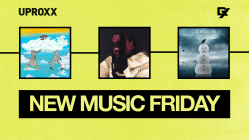Billboard recently discovered Best Buy plans to wipe all the CDs off their shelves starting July 1.
Yep, it’s officially the end of an era.
Nostalgia aside, it’s a move that should have been made a long time ago. Compact discs are more expensive than a streaming service, less coveted than records, and are increasingly irrelevant as new laptops and cars come without disc slots.
To all you old heads and not-so-old-heads who are collectively losing your shit over the pallbearing of your beloved medium, I get it. I was once a staunch defender and obsessive collector of CDs. It was to the point, once, that I was away from home and had heard about a tornado warning for my town.
One of my first thoughts? “I’m worried about my CDs.”
They were so much fun. The liner notes, complete with shoutouts and thank yous and tidbits about the album’s creation, were almost as enjoyable as the music itself. There were the photo shoots, which featured black-and-whites of rappers hanging out with kids from their ‘hood, surrounded by gorgeous models, or shamelessly promoting their clothing lines (looking at you, Shawn Carter). And there was simply the fact that you could amass more CDs on your shelf than the number of shoes in Kanye’s closet, and sometimes just marvel at the abundance of excellence that sat just to the left of your underwear drawer.
And yet, that time has long passed. Consequence of Sound reported that the number of CDs sold in the United States dropped from 800 million in 2001 to 89 million in 2017. That’s nearly a 90 percent decline in overall sales, which means that the masses no longer care to clutter their homes with polycarbonate plastic. During a recent Footaction event that showcased the talents of iconic Hip Hop photographer Jonathan Mannion, HipHopDX Editor-In-Chief Trent Clark told me that Mannion said the decline of physical music copies hasn’t changed his vision on how he shoots cover art. If anything, he says it’s impacted it.
Accepting the end of CDs isn’t about conforming for the sake of conforming, though. It’s frustrating that Tidal and Apple Music, for example, are in a war that keeps certain albums off either streaming service. However, for $9.99 per month plus tax, either of those services, as well as Google Play or Spotify, offer multiple lifetimes’ worth of music compared to a 15-track CD. Even if one were to subscribe to both Tidal and Apple Music, that’s still just an Andrew Jackson per month as opposed to buying three or four CDs for an average of $60 and change.
Embed from Getty Images
Signed CDs are cool and all but current fans have shown they much rather take a flick for Instagram or Snapchat with their favorite artists. Look at the numbers.
I know, I know, you’ve probably got memories of popping in Speakerboxxx/The Love Below and dancing around to “Hey Ya!” during a middle school sleepover. Or you and your boys fondly recall wearing out the skeleton-covered E. 1999 Eternal while driving and toking. There’s the physical component, you say. So often I hear, “I like to be able to hold it in my hand.” And you know what? I get that. Completely. But if that’s the case, records are a much better option. Sure, they can be more expensive, but if you’re that much of an avid collector that you’re willing to shell out the aforementioned $60 per month over $10 or $20 for a streaming service, the difference shouldn’t be that big of a deal. Record players and records offer a unique sound and are a conversation piece when entertaining houseguests. Unlike your CD, which skips every three tracks and is blaring from a boombox that looks like it was jacked from the set of Brown Sugar.
Still not convinced? Let’s talk accessibility. I’m writing this from a Chromebook which has no CD drive. I listen to music on Tidal or YouTube and watch movies on Netflix or Amazon. What good is waiting out for the physical copy of DAMN. or In Celebration of Us if you can’t even play it in your car?
Put your cents where it makes sense, with either streaming services, records or both. Then, Frisbee-toss your compact discs into the trash.
If you still hold dear to the physical format, become part of the trend that saw vinyl LPs account for 8.5 percent of all album sales last year – a 6.5-percent jump from 2016.
It’s past time.











I get it, dollar wise it makes more sense. However, nothing sounds more crisp than the sound of a CD. Not to mention being able to see who produced and wrote the songs. Where the sample came from. All of the intangibles music lovers like. I know you can see that on your device too but that’s my point, I don’t want the distraction of a device. I just want to listen to the music.
Good point but is it a distraction for users who don’t have the life experience of thumbing through album booklets and only know how to navigate thru devices?
It can be. Consider it a chance to learn a new skill like those of us who grew up without the devices and had to learn how to use them. Like using a card catalog at the library. It’s a good thing to learn how to drive even if you always take public transportation.
Rappers make pennies on streams. Yes, its an easier way to promote, but indie rappers that count on shows and CD sells would be affected greatly this way.
This hipster fad of vinyl is the dumbest shit I’ve seen in a while. If the music wasn’t originally recorded on vinyl there’s no logical point in producing it.
I get the push for streaming because of the convince but streaming is giving the labels too much power. They can snatch songs off the albums on streaming services at will for whatever reason. Must listening to older albums on tidal this morning, I see songs blacked out where you can’t listen to them on certain older albums on there. Can’t do that with physicals because they are forever. Also you have a lot less money going to the artist with streaming compared to physicals and digital purchases. Then at the end of the day it’s art, art is meant to be held imo. The artwork and such is just as important as the music. That’s the reason for these goofy ass producer tags at the beginning of the songs to let the people know who produced what because there is no production credits to read (with the exception of tidal but it’s more work on that than just flopping through a booklet). What’s next, we’re gonna pay for holograms to go on the wall for a limited time instead of buying paintings?
With this trend, I wouldn’t be surprised if albums become a thing of that past as well. Physical album sales are down as stated, and the majority of people who purchase mp3’s buy individual songs as opposed to an entire album. I can, easily see in the future, artists just releasing songs at will periodically..
you’re spot on bro.. people don’t even care for full albums anymore… they just want to hear the next streaming single until the next one comes out
For the most part, I only buy what I cannot stream. Believe it or not, there still are some albums and artists out there that aren’t on Spotify, tidal, or bandcamp. iTunes is often overpriced, why charge the same as a cd, when you don’t have to pay for packaging? On another note, I wish someone would create a player so we don’t have to use our phones for music 24/7 outside the home.
So an ipod?
A player that’s compatible with streaming sites, is there a way to transfer music from tidal or Spotify to an iPod classic?
I ACTUALLY LIKE TO OWN THE MUSIC I PURCHASE VS LEASING VIA STREAMING SERVICE. I STREAM AND I BUY VINYL AND CDS. REALLY DEPENDS ON HOW MUCH YOU (THE LISTENER) VALUE’S MUSIC.
Give me a physical copy any day… I still like looking at cover art ect
I knew this was coming the biggest blow is for us music lovers who like to read the credits and things of that nature…i feel like most major albums need to include the digital booklet like they use to have on itunes before full streaming took place.
So Shitspotify paid for an article i see… hell no, if you like an album buy it physical, and for listening to it on an ipod, phone or anywhere just torrent the fuck out of it.
Im gonna torrent tf out of your butt hole
you have piqued my interest!
record and put it up online.
If can’t touch I won’t pay for it.. CD or nothing.
U can tuch me for free bic boy. Oooohweeee
Let’s talk quality. Where can i stream lossless ?
Y’all think it’s bougie I’m like fine! But I’m tryin’ to give you a million dollars worth of game for $9.99! I turned a 2 to a 4, 4 to an 8!!!
CD OR NOTHING !
2 reasons I still fux with CDs. One is I own a lot of albums on CD that isnt on Spotify. Ob4cl pt2 for example. Second reason is cover, booklet and disc art, credits, sometimes lyrics and artists thank you list. Buying CDs is more than music. Its dope art and a good read.
One more reason, sound quality damn it. CD is way better than streaming services.
The sound quality will always beat streaming any day. So now i will have to put a signal processor in my car and make sure everything is downloaded in a FLAC format to achieve the quality im looking for.
Anyone remembers DVD audio disc? Those would make the shitty album sound really great.
All I wanted was to finish off this era with a copy of Detox. Like- I was ready to move on so long as I had that. Thank you Dr Dre now Ill feel incomplete forever lol
F*CK ‘Bestbuy’ they NEVER had the Music Industry’s back! They came is sellin’ low prices, to get you to come in and Buy a Computer or Phone, and ended up puttin’ all the Super COOL ‘Mom and Pop’ indie Record Stores outta business! (that BUILT the Hip Hop and Alternative World) and f*cked everyone over when ‘profits’ dipped! Start a BOYCOTT called ‘BUST BUY’ and take your business to TARGET or WALLMART or anywhere else! Stand Up For the INDIES, the UNDERDOGS, these corporations don’t give a F*CK about YOU the Music Maker or Music Lover! #BustBuy
You know what was best about CDs? I could flip them over and snort lines of meth off them with my dad before he stuck his compact disk in my hard drive. He would say CDs nuts and then pummel me. Ahwatukee, Arizona in a crack den is where I spent most of my days as my fathers meth slave doing “hot rails” while being railed like the nut dump I am. I was a bad boy, daddys bic boy- I deserved it for all of the times I slapped my grandmother and stole her percocet. So, to recap, im a guy that did crystal meth and sex with my dad. My name is billy and just thinking about this makes my little junk box semi hard. Now Im going to post up in a stall in mcdonalds bathroom, ass naked, and smoke a huge bowl of meth while manipulating myself from both ends to a picture of e40 from the Hall of Game cd
Ugggggh fuck yeah
Cds over download any day. I like to see who wrote and who produced what. That’s just me . A download always feels to disposable. It can disappear just by deleting.
You guys do realize that the quicker we kill CDs the quicker they will comeback cool and relevant again right?
oh yeah you’ve gotta be right, i was just reading about the comeback cassettes are making these days
I think part of the reason we get watered down, generic music these days is because of the Streaming stuff and that no one is willing to pay for music anymore. I can understand artist and the label for this. Why give us 1 Quality Album if you not paying full price. They rather give you 10 diluted Albums then
Shoot let best buy do that. One more reason I will not shop there.
Its 2018 who still buys CDs lol
people who want the physical copy of a product and don’t want to rely on streaming crap to listen to it. That’s who.
I don’t think you understand how much that price from CD to Vinyl means for people who aren’t privileged. My family lived well, but still having my own vinyl collection was unimaginable because of how much it costs. Thus, I resorted to buying CD’s and to this day have an active collection, but you making an assumption that just because I could afford CD’s we should be able to spend more on vinyls is rather insulting.
“Put your cents where it makes sense, with either streaming services, records or both. Then, Frisbee-toss your compact discs into the trash.” – to this I say let people make their own choices to what they enjoy and is allotted for their income. Suck a dick for having a pompous and arrogant outlook on the situation.
Stream your music son its fucking 10 bucks a month and less than one CD.
Damn homie really has hella cd towers at the house, and a binder full of cds in a car. Lol
I’m not flush with cash either. Figure out what’s going on before you assume and say stupid things. I have a streaming service in part bc it’s much more affordable for me than buying music. If you have money to amass a large CD collection you have no right to sit and say that I am somehow more financially privileged than you. If you are that hard up on cash, why spend $ on an outdated form of media? If you have the money for CDs, records aren’t THAT much more. As someone who doesn’t have the dough for either, I’m not being “privileged” by saying that.
And Lone, put your name by your words if you’re gonna throw around words like “suck a dick.” Hiding behind an anonymous screen name is cowardly and weak.
Can’t remember the last time I bought a CD. I’ll take streaming and downloading over it. Sounds better in a car. R.I.P. cds
250ish MILLION CDs still sold per day they’ll still be around quite some time
Wrong son check yer facts
“and when has a T-shirt come with an album” HipHopsite.com back in the day used to always have tshirts and stickers with album drops, that was the ish!!!!
Probably 8 years ago, I started to sell all my records. They had become cumbersome everytime I moved. Nothing crazy, like 600.
I moved again last week. I threw out a ton of CDs. Stuff I want to play once a year I will stream (sometimes I still want to hear Lord Finesse)
All that aside, the studies prove you value the music more if you own something physical. Explains streaming and Lil….
People always devalue things that come easy… It’s easier to go on Apple Music and stream music than it is to go to a Best Buy and purchase it…
When an artist sells 100 albums they make roughly like $6… When their album is streamed 100 times they get like 90 cents. This is a way to control the artists and we’re gonna continue to hear more garbage as artists try to out put as much music as possible to make decent money. The music will continue to suffer, as it has been since the dawn of streaming.
Thx for deleting my comments for nothing you fuckhead bitches. Hang yourselves on the 1st tree by your non-existent nuts you na:zi censors!!!!
FUCK MURS TOO FOR WORKING FOR THIS NA ZI SITE. NEARLY ANYTHING I COMMENT THEY DELETE IT FOR NO REASON. GRAB MURS BY HIS BEARD AND THROW HIM UNDER THE MORNING BUS.
fuck this bullshit CAC article
I agree.. How oldis the mf that wrote this. sounds like a pompous bastard
NEVER GIVE UP THE HARD COPIES…. Ownership is the wave. Go ahead and think you own anything from a streaming service.
This exact attitude is why music as a whole is trash now. ESPECIALLY Rap music!! Musicians making less than a penny from a stream and 1 CD sale is equivalent to 1200 streams?!? FOH! As the physical form continues to disappear so will the quality of the music. This world is being devalued and destroyed all in the name of convenience. Enjoy your blonde latte and your wi-fi while you witness the disappearance of true art. touche!
a lot of music these days is so disposable, especially when its only available to stream. I like to feel nostalgia sometimes when i listen to music. nothing does that more than unearthing an old cd….not blindly scrolling to the bottom of your iPhone screen
younger generations won’t grow up with vinyl, cassette, cd’s and therefore streaming is all they will know. the decline of physical copies is inevitable. but doesn’t mean there isn’t a niche for those who appreciate having a physical copy, slicing open the plastic wrapper and popping the cd out of the case….
I got some words for you that cant be heard on “cd” or “streamed”..u gotta read it#let me no#
The only thing I hate about playing music from my phone is that sound and quality isn’t as good or loud as if I was to play a cd.
It’s incredibly idiotic for anyone to tell anyone how to listen to music. If downloading or streams is your preference, do that. If getting physical music is your preference, do that.
I personally favor CD’s because the sound quality is second to none. Quality music wasn’t meant to listened to on a mobile device. To me, the photography/artwork, credits, thank you’s, and knowing who worked on the project is important. CD’s sales have gone down, but there’s no reason to expect them to go away completely, and Best Buy isn’t the authority of music being pressed.
GANGSTA’S DON’T STREAM !!!
Fuck hiphopdx and fuck streaming
I don’t like either of these options. I don’t really care about physical objects, unless it’s something I’m really into and want to have in a collection like To Pimp a Butterfly or Makaveli. But I also don’t like streaming services; I’ll buy it digitally. Then I at least have an MP3 or whatever file I can get that I can listen to anywhere there’s an aux cord. Things get pulled from streaming services. Every month there’s a long list of stuff pulled from Netflix. You know what I can’t watch on Netflix that I used to watch over and over? Doctor Who. I don’t care about her music much, but remembr when all of Taylor Swift’s stuff was pulled from Spotify? That sucked!
Again, I don’t necessarily want a physical copy, but I want a copy I actually own and I can do what I want with.
As far as new laptops and cars without CD slots go, they do sell CD drives with USB connectors on Amazon. You can use those to upload your favorite albums to your laptop, then transfer them to your iPhone then plug it to your aux cord in your ride. Boom, problem solved. Until CDs become completely extinct, then I’m still buying them. But only for those that are actually worth buying since most music is disposable garbage now. Can’t tell me nothing.
Why the Fuck would you do all that when you just PULL OUT YOUR IPHONE and stream the music from that??? Get it with the times gramps!
I’m 28 actually, but thanks for your input. You can go back to playing in traffic now.
It’s time for HHDX to stop telling people what to do. It’s patronizing.
CDs are only good for the crack between a kanye west fan’s quivering ass cheecks
Aaron McKrell, you say it cost more to invest in physical copies of music (CDs) verses streaming services. A part of that is true. What you and many others fail to realize is, with services like Apple Music or Tidal, you’re not actually buying the music to fully own. You’re simply leasing the music!! Great for companies. A double edged sword for consumers. Once you decide to stop paying that monthly subscription you’ll no longer have access to the music you’ve collected. So as a result many continue to pay for the monthly service because they don’t want to lose their music. As oppose to CDs, you’re fully vested in owning the music. Put it another way: Imagine paying Best Buy $10 a month for a music service where you can freely pick out CDs, and once you end your service, you have to give those CDs back to Best Buy??? That shit sounds crazy af. But that’s exactly what we’re doing now. And if CDs go completely, we’ll have no choice but to be forced into a situation where we’re only leasing the music. And Apple Music, while they say you can “download” the music to your device, it’s encrypted and still connected to an active account on the service.
I still buy CDs and will continue to buy them when they stop making CDs then I will stop buying music.
Plus most ppl who buy CDs anymore are collectors and they’re probably not spending a ton and probably use streaming services too. This false dichotomy isn’t necessary
this guy is fucking stupid haha sucks a tornado sucked all your cds up
This Article is garbage! Obviously this guy works for a music streaming company and wants everyone to become enslaved to their extortionate ways! Sieg Heil!!!! Sieg Heil!!! He even condones environmentally damaging land-fills in which to place your CD’s in…. what a complete moron. This is exactly the same DUMB-ASS mentality that led those movie studio bosses in the 1930’s to destroy most of their silent movie prints in favor of ‘talkies’…. and what a loss to our society and culture that was! IGNORE THIS ‘FASHION VICTIM’ RANT! This ‘so-called’ music fan has no grasp of what music actually is….. which is more than being just a leased sound file. What A LOSER!!!!
I just joined spotify…its great, but I also like the music from my marantz cd63ki, I also connected my Arcam cd 72…they all sound different. Through Grado 325 headphones the Arcam softens, the marantz sparkles and spotify is clear…I can decide what to keep and let go…might not let any, and just listen to music that sounds best (to me), and spotify for convenience (and good sound). My other system is a Marantz Pm7005, REL t5 sub and dynaudio audience 52 speakers. Been mostly listening through the grado headphones. Do other people think that sources make no difference, after all they are coming through the same amp.
I’m streaming my music on a daily basis. Commute, work, commute, around the house. Rince and repeat. I like it that way, cause I have all the music I need at the moment. I do have physical copies of a few special albums. It’s my tribute to the greatest. When I play them, it’s an event. Its not a daily thing, this music is not for everyday use. It’s special to me. Cds won’t go away, because there is a lot of sentiment for the physical copy out there.
I’m a huge music fanatic and still buy CDs, cassettes and records every couple weeks at my local used-media store, as well as constantly use my free Spotify account. If CDs were selling as poorly as this article suggests, there’d be no reason for stores like Barnes and Noble to allocate about 1/3 of their physical media space for CDs.
It’s funny, movies have no value to me, I “rent” them online, watch once and rarely – if ever – go back. Music is a whole different story. I generally buy FLAC or other lossless files on websites like 7digital, BandCamp, Beatport, Juno Download or even the Tidal store. However, even tough I scoured the internet for every other niche lossless store that exists, they don’t always have what I want. I am forced to buy CDs, albeit used, and rip them. One thing I do, though, is keep the receipts so no schmuck can come and tell me I stole my music. All that said, I keep 3 backups around and one in the cloud. It all depends on the level of “how much do you really care?”. Telling people which is THE way to keep music is just plain stupid, equivalent to telling them they have to love mustard-flavored ice cream.